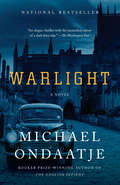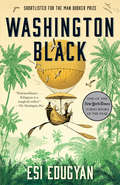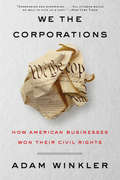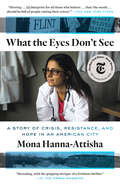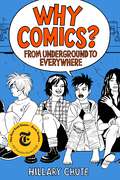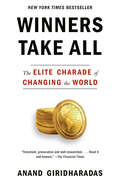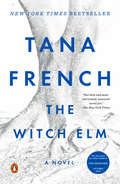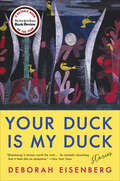Special Collections
100 Notable Books of 2018
- Table View
- List View
Warlight
by Michael OndaatjeFrom the internationally acclaimed, best-selling author of The English Patient: a mesmerizing new novel that tells a dramatic story set in the decade after World War II through the lives of a small group of unexpected characters and two teenagers whose lives are indelibly shaped by their unwitting involvement.
In a narrative as beguiling and mysterious as memory itself--shadowed and luminous at once--we read the story of fourteen-year-old Nathaniel, and his older sister, Rachel.
In 1945, just after World War II, they stay behind in London when their parents move to Singapore, leaving them in the care of a mysterious figure named The Moth.
They suspect he might be a criminal, and they grow both more convinced and less concerned as they come to know his eccentric crew of friends: men and women joined by a shared history of unspecified service during the war, all of whom seem, in some way, determined now to protect, and educate (in rather unusual ways) Rachel and Nathaniel.
But are they really what and who they claim to be? And what does it mean when the siblings' mother returns after months of silence without their father, explaining nothing, excusing nothing?
A dozen years later, Nathaniel begins to uncover all that he didn't know and understand in that time, and it is this journey--through facts, recollection, and imagination--that he narrates in this masterwork from one of the great writers of our time.
A New York Times Bestseller
Washington Black
by Esi EdugyanLONGLISTED FOR THE MAN BOOKER PRIZE 2018 |
From the author of the award-winning international best seller Half-Blood Blues comes a dazzling new novel, about a boy who rises from the ashes of slavery to become a free man of the world.
George Washington Black, or "Wash," an eleven-year-old field slave on a Barbados sugar plantation, is terrified to be chosen by his master's brother as his manservant. To his surprise, the eccentric Christopher Wilde turns out to be a naturalist, explorer, inventor, and abolitionist.
Soon Wash is initiated into a world where a flying machine can carry a man across the sky, where even a boy born in chains may embrace a life of dignity and meaning--and where two people, separated by an impossible divide, can begin to see each other as human.
But when a man is killed and a bounty is placed on Wash's head, Christopher and Wash must abandon everything. What follows is their flight along the eastern coast of America, and, finally, to a remote outpost in the Arctic. What brings Christopher and Wash together will tear them apart, propelling Wash even further across the globe in search of his true self.
From the blistering cane fields of the Caribbean to the frozen Far North, from the earliest aquariums of London to the eerie deserts of Morocco, Washington Black tells a story of self-invention and betrayal, of love and redemption, of a world destroyed and made whole again, and asks the question, What is true freedom?
We the Corporations
by Adam WinklerWe the Corporations chronicles the revelatory story of one of the most successful, yet least known, “civil rights movements” in American history.
We the Corporations chronicles the astonishing story of one of the most successful yet least well-known “civil rights movements” in American history. Hardly oppressed like women and minorities, business corporations, too, have fought since the nation’s earliest days to gain equal rights under the Constitution—and today have nearly all the same rights as ordinary people.
Exposing the historical origins of Citizens United and Hobby Lobby, Adam Winkler explains how those controversial Supreme Court decisions extending free speech and religious liberty to corporations were the capstone of a centuries-long struggle over corporate personhood and constitutional protections for business. Beginning his account in the colonial era, Winkler reveals the profound influence corporations had on the birth of democracy and on the shape of the Constitution itself. Once the Constitution was ratified, corporations quickly sought to gain the rights it guaranteed. The first Supreme Court case on the rights of corporations was decided in 1809, a half-century before the first comparable cases on the rights of African Americans or women.
Ever since, corporations have waged a persistent and remarkably fruitful campaign to win an ever-greater share of individual rights. Although corporations never marched on Washington, they employed many of the same strategies of more familiar civil rights struggles: civil disobedience, test cases, and novel legal claims made in a purposeful effort to reshape the law. Indeed, corporations have often been unheralded innovators in constitutional law, and several of the individual rights Americans hold most dear were first secured in lawsuits brought by businesses.
Winkler enlivens his narrative with a flair for storytelling and a colorful cast of characters: among others, Daniel Webster, America’s greatest advocate, who argued some of the earliest corporate rights cases on behalf of his business clients; Roger Taney, the reviled Chief Justice, who surprisingly fought to limit protections for corporations—in part to protect slavery; and Roscoe Conkling, a renowned politician who deceived the Supreme Court in a brazen effort to win for corporations the rights added to the Constitution for the freed slaves. Alexander Hamilton, Teddy Roosevelt, Huey Long, Ralph Nader, Louis Brandeis, and even Thurgood Marshall all played starring roles in the story of the corporate rights movement.
In this heated political age, nothing can be timelier than Winkler’s tour de force, which shows how America’s most powerful corporations won our most fundamental rights and turned the Constitution into a weapon to impede the regulation of big business.
What the Eyes Don't See
by Mona Hanna-AttishaFlint was already a troubled city in 2014 when the state of Michigan—in the name of austerity—shifted the source of its water supply from Lake Huron to the Flint River. Soon after, citizens began complaining about the water that flowed from their taps—but officials rebuffed them, insisting that the water was fine. Dr. Mona Hanna-Attisha, a pediatrician at the city’s public hospital, took state officials at their word and encouraged the parents and children in her care to continue drinking the water—after all, it was American tap water, blessed with the state’s seal of approval.
But a conversation at a cookout with an old friend, leaked documents from a rogue environmental inspector, and the activism of a concerned mother raised red flags about lead—a neurotoxin whose irreversible effects fall most heavily on children. Even as circumstantial evidence mounted and protests grew, Dr. Mona knew that the only thing that could stop the lead poisoning was undeniable proof—and that to get it, she’d have to enter the fight of her life.
What the Eyes Don’t See is the inspiring story of how Dr. Mona—accompanied by an idiosyncratic team of researchers, parents, friends, and community leaders—proved that Flint’s kids were exposed to lead and then fought her own government and a brutal backlash to expose that truth to the world. Paced like a scientific thriller, this book shows how misguided austerity policies, the withdrawal of democratic government, and callous bureaucratic indifference placed an entire city at risk. And at the center of the story is Dr. Mona herself—an immigrant, doctor, scientist, and mother whose family’s activist roots inspired her pursuit of justice.
What the Eyes Don’t See is a riveting, beautifully rendered account of a shameful disaster that became a tale of hope, the story of a city on the ropes that came together to fight for justice, self-determination, and the right to build a better world for their—and all of our—children.
Why Comics?
by Hillary ChuteFilled with beautiful full-color art, dynamic storytelling, and insightful analysis, Hillary Chute’s Why Comics? reveals what makes one of the most critically acclaimed and popular art forms unique and so appealing, and how it got that way.
Over the past century, fans have elevated comics from the back pages of newspapers into one of our most celebrated forms of culture, from Fun Home, the Tony Award–winning musical based on Alison Bechdel’s groundbreaking graphic memoir, to the dozens of superhero films that are annual blockbusters worldwide. What is the essence of comics’ appeal? What does this art form do that others can’t?
Whether you’ve read every comic you can get your hands on or you’re just starting your journey, Why Comics? has something for you. Author Hillary Chute chronicles comics culture, explaining underground comics (also known as “comix”) and graphic novels, analyzing their evolution, and offering fascinating portraits of the creative men and women behind them. Chute reveals why these works—a blend of concise words and striking visuals—are an extraordinarily powerful form of expression that stimulates us intellectually and emotionally.
Focusing on ten major themes—disaster, superheroes, sex, the suburbs, cities, punk, illness and disability, girls, war, and queerness—Chute explains how comics gets its messages across more effectively than any other form. “Why Disaster?” explores how comics are uniquely suited to convey the scale and disorientation of calamity, from Art Spiegelman’s representation of the Holocaust and 9/11 to Keiji Nakazawa’s focus on Hiroshima. “Why the Suburbs?” examines how the work of Chris Ware and Charles Burns illustrates the quiet joys and struggles of suburban existence; and “Why Punk?” delves into how comics inspire and reflect the punk movement’s DIY aesthetics—giving birth to a democratic medium increasingly embraced by some of today’s most significant artists.
Featuring full-color reproductions of more than one hundred essential pages and panels, including some famous but never-before-reprinted images from comics legends, Why Comics? is an indispensable guide that offers a deep understanding of this influential art form and its masters.
Winners Take All
by Anand GiridharadasAn insider's groundbreaking investigation of how the global elite's efforts to "change the world" preserve the status quo and obscure their role in causing the problems they later seek to solve.
Former New York Times columnist Anand Giridharadas takes us into the inner sanctums of a new gilded age, where the rich and powerful fight for equality and justice any way they can--except ways that threaten the social order and their position atop it. We see how they rebrand themselves as saviors of the poor; how they lavishly reward "thought leaders" who redefine "change" in winner-friendly ways; and how they constantly seek to do more good, but never less harm. We hear the limousine confessions of a celebrated foundation boss; witness an American president hem and haw about his plutocratic benefactors; and attend a cruise-ship conference where entrepreneurs celebrate their own self-interested magnanimity.
Giridharadas asks hard questions: Why, for example, should our gravest problems be solved by the unelected upper crust instead of the public institutions it erodes by lobbying and dodging taxes? He also points toward an answer: Rather than rely on scraps from the winners, we must take on the grueling democratic work of building more robust, egalitarian institutions and truly changing the world. A call to action for elites and everyday citizens alike.
A New York Times Bestseller
The Witch Elm
by Tana FrenchToby is a happy-go-lucky charmer who's dodged a scrape at work and is celebrating with friends when the night takes a turn that will change his life - he surprises two burglars who beat him and leave him for dead. Struggling to recover from his injuries, beginning to understand that he might never be the same man again, he takes refuge at his family's ancestral home to care for his dying uncle Hugo.
Then a skull is found in the trunk of an elm tree in the garden - and as detectives close in, Toby is forced to face the possibility that his past may not be what he has always believed.A spellbinding standalone from one of the best suspense writers working today, The Witch Elm asks what we become, and what we're capable of, when we no longer know who we are.
A New York Times Bestseller
Your Duck Is My Duck
by Deborah Eisenberg“[Eisenberg] reminds us in every line of certain saving virtues: wit, wild intelligence, great heart, the beauty of the inquiring human voice. If our culture can produce a writer this wonderful, there must be something beautiful about us yet.” — George SaundersInstead of forcing her characters’ stories into neat, arbitrary, preordained shapes, [Eisenberg] allows them to grow organically into oddly shaped, asymmetrical narratives—narratives that possess all the surprising twists and dismaying turns of real life.” — New York Times“Deborah Eisenberg, one of America’s finest writers, offers new ways of seeing and feeling, as if something were being perfected at the core.” — San Francisco Chronicle“Reading [Eisenberg] makes you wish, as you study the family in front of you in the grocery line, that you could see their thoughts rendered as one of Eisenberg’s stunning inner monologues.” — Los Angeles Times“...[S]uperlative and entertaining...Eisenberg is funny, grim, biting, and wise, but always with a light touch and always in the service of worlds that extend far beyond the page. A virtuoso at rendering the flickering gestures by which people simultaneously hide and reveal themselves, Eisenberg is an undisputed master of the short story.” — Publishers Weekly (starred review)“[Eisenberg] is always worth the wait...so instantly absorbing that it feels like an abduction...This book offers no palliatives to its characters or to its readers — no plan of action. But it is a compass.” — The New York Times“Eisenberg is a gorgeous writer...I thank my stars that there’s a writer in the increasingly imperiled world as smart and funny and blazingly moral and devastatingly sidelong as she is.” — New York Times Book Review“Every character is memorable, every situation seizes our attention, and not a single word is out of place...It’s my fervent hope...that someday we’ll have the opportunity to look back on the many more stories that Deborah Eisenberg has yet to write.” — Financial Times
